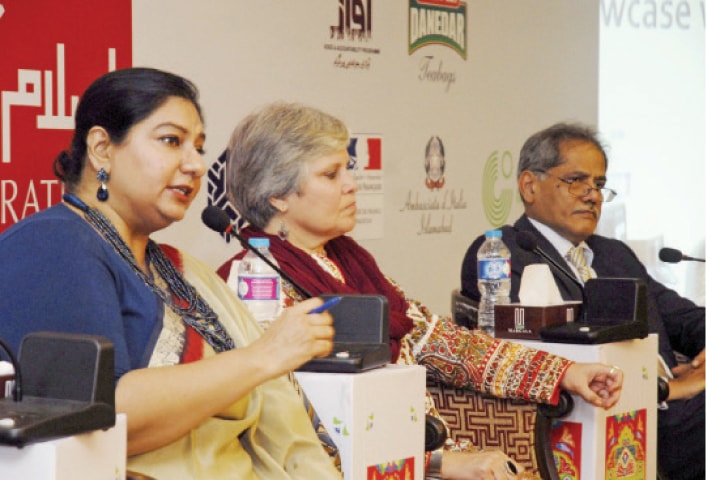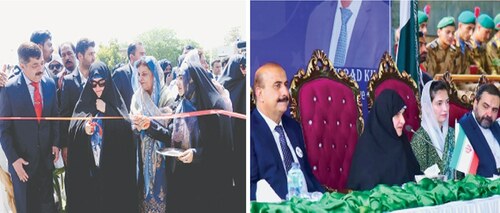ISLAMABAD: With many still reeling from the shock of the lynching incident at Mardan University, it is no surprise that the name of the student murdered over blasphemy allegations came up numerous times in the two sessions on gender and minority issues held on the second day of the Islamabad Literature Festival (ILF) on Saturday.
PPP MNA Sherry Rehman lamented that the state has gradually been losing its monopoly on violence, which allows others to take up arms and “lynch women and innocent students”.
Ms Rehman was speaking at a session on ‘Gender, Violence, Law and Power in Pakistan’ and was joined by PPP MNA Nafisa Shah and researcher Ijaz Shafi Gilani. She said that in the 70s and 80s religion and politics were tied together, which resulted in murderous consequences for women and minorities who continue to suffer in Pakistan today. Marginalised groups have suffered from the “privatisation of justice”, resulting from the Qisas and Diyat laws introduced by General Zia-ul-Haq.
Dr Shah shared the findings from her book ‘Honour Unmasked’, which highlights how both the justice system and informal channels of redress have failed to provide justice to victims of honour killings in Sindh. She argued that customs such as karo-kari in Sindh appropriate the language of honour as a means of legitimising power and mask the underlying motivations for such murders.
Dr Shah said that conviction rate for perpetrators of ‘honour killings’ in court is deplorable and most such cases result in acquittals.

Talking about the lynching incident in Mardan, she reminded the audience that the discourse of the state and power circles has resonances in wider society. She argued that the prime minister’s son-in-law's “apocalyptic speeches” against blasphemous online content were echoed in parliament and set the stage for such an incident. “In all such acts of violence I implicate the state and power,” she said.
Dr Gilani also discussed Dr Shah’s book in detail and quoted from the book to warn against the “glamorisation” of the brutal practice of karo-kari as has been done by certain “internal Orientalists” for their own purposes. Dr Gilani argued that public discourse around honour killings is important but can also “trivialize” the issue.
Dr Gilani’s comments drew a strong response from Sherry Rehman who argued that the issue of honour killings has neither been trivialised nor glamorised in public discourse. In response to the moderator’s question about “moving beyond politics”, Ms Rehman retorted that every act is political and much has been accomplished in the achievement of women’s rights through politics. “For women the public and private come together,” she argued.
Ms Rehman reminded those seated in the audience that they are the country’s intellectual elite and must raise their voices on women’s issues. “You cannot absolve yourselves. There is no silver bullet, we have to invest in an arduous everyday struggle,” she said.

Much of the time for the session on ‘Women and Excluded Groups in Political Parties and Legislative Bodies’ was taken up by activist and commentator Marvi Sirmed who shared the findings of her study on the of participation of women and minorities in decision making in political parties in Pakistan.
Ms Sirmed’s study found that special wings within political parties have become the main way in which women and minorities are invited to participate. However, these special wings led to a “ghetto-isation” of these groups and do not translate into real decision-making power.
Ms Sirmed noted that setting up a special wing and keeping the rest of the party for men has been a strategy through which political parties have fulfilled the constitutional requirement of including marginalised groups.
ANP MNA Bushra Gohar agreed with Ms Sirmed, and said where women get a wing men get a whole party. She explained that her party has an ideological stance against special wings and sees women and minorities as equal participants in party affairs. “Reserved seats [similarly] become a form of reverse discrimination,” she said.
To ensure that women are given tickets to contest elections from general seats, the Women’s Parliamentary Caucus has called for a constitutional requirement for all political parties to give 10pc of tickets to women.
Pakistan Institute for Parliamentary Studies Director Zafarullah Khan argued that lack of economic empowerment is one of the biggest reasons for the exclusion of women and minorities from political life. “Political parties are a club of electables and women and minorities often do not have the economic strength to join such a club,” he said.
Published in Dawn, April 16th, 2017













































